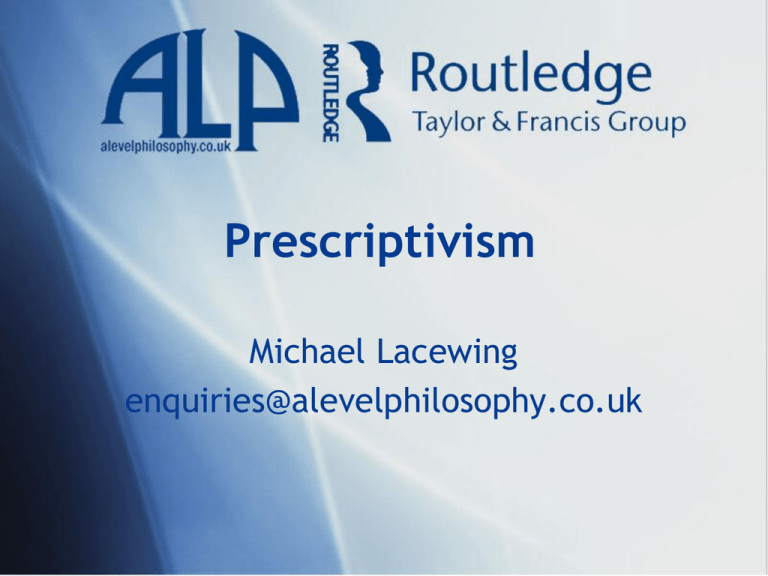Prescriptivism
advertisement

Prescriptivism Michael Lacewing enquiries@alevelphilosophy.co.uk Cognitivism vs. non-cognitivism • What are we doing when we make moral judgments? • Cognitivism: moral judgments, e.g. ‘Murder is wrong’ – Aim to describe how the world is – Can be true or false – Express beliefs that the claim is true • Non-cognitivism: moral judgments – Do not aim to describe the world – Cannot be true or false – Express attitudes towards the world Prescriptive meaning • Hare: moral language is descriptive and prescriptive – The function of moral principles is to guide conduct – Not to express feelings or influence you • Two types of prescriptive meaning – Imperatives (right/wrong): ‘eating meat is wrong’ = ‘don’t eat meat’ – Value judgments (good/bad): commend as guidance Good • Good – chocolate, teacher, person – Praiseworthy – Good doesn’t mean the features that make something good (sweet, juicy strawberry), but commends it on the basis of those features • Commending is ‘free’ – the features don’t entail the moral judgment – The facts about being honest don’t entail that honesty is good Good • Something is good relative to an assumed set of standards – So good always has some descriptive meaning as well, in context – Morally good: good as a person • If two things are identical, they are either both good or both not good – The set of standards entails consistency in our judgments Moral language • Similar remarks apply to ‘right’ and ‘ought’ – They are intended to guide action – They assume standards relating to being a good person – Two similar actions must be either both right or both not. We must ‘universalize’ our moral judgments. Objection • Moral language has many other functions than prescription – Persuasion, confession, complaint • Reply: prescription is central, since the primary function of morality is to guide conduct • Objection: but expressive language also links judgments to action and motivation Moral reasoning • Hare: Prescriptivism explains how moral discussion is rational – We can ask about reasons for making a particular prescription – Morality requires consistency – Prescriptions can be inferred from other prescriptions • ‘Do not take innocent human life. Abortion is the taking of innocent human life. Therefore, do not commit abortion.’ Objection • The only rationality is consistency – There can be no criticism of my views if I am consistent, e.g. if I accept racism if we swapped races – Kant grounds universalizability on objective reason; Hare claims prescriptions are ‘free’ • Reply: to frustrate one’s own interests is irrational – Why? We don’t want our interests frustrated, but why say they ought not to be frustrated?






